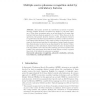Free Online Productivity Tools
i2Speak
i2Symbol
i2OCR
iTex2Img
iWeb2Print
iWeb2Shot
i2Type
iPdf2Split
iPdf2Merge
i2Bopomofo
i2Arabic
i2Style
i2Image
i2PDF
iLatex2Rtf
Sci2ools
150
click to vote
IEAAIE
2011
Springer
2011
Springer
Multiple Source Phoneme Recognition Aided by Articulatory Features
This paper presents an experiment in speech recognition whereby multiple phoneme recognisers are applied to the same utterance. When these recognisers agree on an hypothesis for the same time interval, that hypothesis is assumed to be correct. When they are in disagreement, fine-grained phonetic features, called articulatory features, recognised from the same speech utterance are used to create an articulatory feature-based phoneme. If the output of either of the phoneme recognisers for that interval matches the articulatory feature-based phoneme, then that phoneme is selected as an hypothesis for the interval. Underspecification of the articulatory feature-based phoneme is implemented if an hypothesis is not found and the matching process is repeated. The results of the experiment show that the final output accuracy is greater than both of the initial two phoneme recognisers.
| Added | 29 Aug 2011 |
| Updated | 29 Aug 2011 |
| Type | Journal |
| Year | 2011 |
| Where | IEAAIE |
| Authors | Mark Kane, Julie Carson-Berndsen |
Comments (0)

